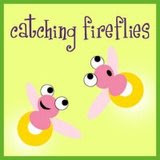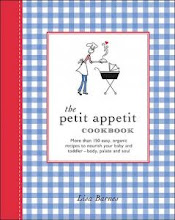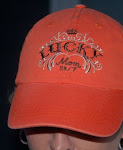Wednesday, June 3, 2009
Chill Out: A New Parenting Trend
Monday, May 25, 2009
Getting Our Kids to Eat Healthy: Alternatives to Negotiating
I've always been interested in the language that parents use with small children when discussing food and nutrition. We've all heard the old threat: "If you don't eat your veggies, no dessert." By saying this, we're setting our kids up to view eating vegetables as undesirable, just a means to get to the good stuff. I'll be the first to say, I love dessert. In moderation.
So how can I talk to my toddler about food and avoid the negotiating and bribery game that drains so many parents and ends in a power struggle?
I recently consulted Dr. William Sears's book, The Healthiest Kid in the Neighborhood. Dr. Sears uses a simple and kid-friendly language when discussing food. He talks of "green light" (best) foods versus "red light" (worst) foods, and uses this terminology to steer kids towards making healthy choices. Dr. Sears also refers to nutritious foods as "grow foods." His article, The ABC's of Teaching Nutrition to Your Kids, is an excellent resource for parents; it offers practical tips for raising a health-conscious child with an adventurous palette (without crowning you Meanest Mother in the World).

Stacie Elliott, founder of New Mommy Help, regularly blogs about supporting and encouraging new moms. She is the mother of 4 beautiful children, twin boys- 6, girl-3, boy-1. I am so grateful for Stacie's expertise in this area (I consider the mom of 4 good eaters an expert!)
I believe proper nutrition begins at birth--preferably breastfeeding. This requires a mom to think about what she is eating right from the start. By the way, this is a fine example of the beginning of motherhood, isn't it? We have to make sacrifices and wise decisions regarding our children that we might never have made otherwise.
As moms, we all know that it doesn't matter what is on our plate; our children want it. Obviously, we can say what we want about food, but in the end our actions speak louder. Modeling healthy eating is a vital form of communication. For example, when our children started on solid foods, I chose to make homemade baby food. As often as possible, I would simply use the food we were having for dinner. If we had baked sweet potatoes, I made a puree for the baby. Of course, this only works when choosing nutritionally sound meals.
We regularly talk about the ingredients and nutritional value in different foods. Like, meat has protein for strong muscles. Fruits and Veggies have various vitamins, etc. Our kids respond well to that and seem to make good choices when given the chance. However, our 6-year-olds are already dealing with peer pressure in this area. They see what other kids eat and drink and want to know why they can't have soda (for example). Since we have already talked about how foods provide various types of nutrition, they can understand our decision better.
In response to the question, "Have I eaten enough to have dessert?" we have designated dessert days. Friday, Saturday, and Sunday are dessert days. Everyone knows dessert is only on weekends. We view it as something special, and it's not expected any other day. We do, however, make exceptions on special occasions (i.e. birthdays). We tell our kids that desserts have lots of sugar and very little healthy ingredients, if any. That's why we do not have dessert every day. We want to take care of our bodies and limit foods that are empty.
Thank you, Stacie, for sharing your wise words of wisdom with us! Please visit Stacie's blog for more information and insight.
Labels: Books, Food and Nutrition, Parenting
Monday, May 18, 2009
Play
I recently heard a mom remark, “I don’t know what I’m going to do with my kids this summer. They don’t know how to just play.” Sound familiar?
I’m making a sweeping generalization here: Today’s suburban kids live by set schedules and organized, adult-regulated activities. We moms shuttle them off to piano lessons, tutoring, baseball practice, art class. We think we’re doing what’s best for our kids. We want them to have opportunities, so we start building our kids’ “resumes” in elementary school.
Yes, I would agree that kids learn discipline, the value of teamwork, and socially appropriate behavior from playing soccer or saxophone. But there’s a seriousness and rigidity to all of this structure, and we’re missing something big. . .
PLAY.
In his outstanding book, Play: How It Shapes the Brain, Opens the Imagintion, and Invigorates the Soul, Stuart Brown, M.D., discusses play as a state of mind. He defines it as “an absorbing, apparently purposeless activity that provides enjoyment and a suspension of self-consciousness and sense of time.”
Notice how Brown says that play is “apparently purposeless.” In his eyes, it is perhaps the most important aspect of brain growth. Brown believes that “play lies at the core of creativity and innovation.”
But we think that kids who fit the mold, who play “the game” with an exceptional GPA and impressive resume (that includes a service trip to Africa, of course), will be rewarded in life.
How many unhappy college graduates do you know?
In recent years, Brown has presented a seminar on play to Stanford sophomores, who he believes are “suffering from low-grade play deprivation, and are so used to their hectic, pressured, high-performance lives (despite still being kids) that they don’t realize what they have missed in the pursuit of academic excellence and success.”
I was that kid. Growing up, I was so tightly wound that I lost sight of play. For me, good grades got old, and there was a huge price to pay for not cutting loose. At the end of the day, who cares about academic accolades and big fat promotions if there is no play.
So, how can we encourage our children to play?
Brown suggests exposing our children to various opportunities at a young age and taking note of their early desires and inclinations, “the natural choices that your child’s early play demonstrates.” Then, encourage those early patterns that result from natural desires to build, sing, create, dance, etc.
So, the next time your child plays with the box instead of the $100 award-winning toy inside of it, swallow your pride and give yourself permission to smile. She is building a world for herself and mastering the most important subject, Life 101.
Thursday, March 26, 2009
Reading: A Way to Connect with Your Spouse

Prior to having a child, my husband and I usually spent our dinnertime recounting our teaching days, which were never short of funny, inspiring, aha! moments. We poured over challenging situations and sought each other's advice in dealing with helicopter parents. I've always viewed our shared passion for educating youth as a gift. It connects us; it's nice to come home to someone who genuinely understands your world.
Labels: Books, Relationships
Thursday, March 19, 2009
Ways to Encourage Your Young Child: What to Say
Although my daughter is only 17 months, I recently attended a seminar called STEP: The Systematic Training for Effective Parenting. I believe that it's never too early to start consciously using a language that promotes mutual respect and positive relationships. My wish for my daughter is that she will one day look in the mirror and see a competent, compassionate, confident woman. I want so much for her, but above all, I want her to know that who she is will always be enough. Below are some phrases I've used (adapted from STEP: Parenting Young Children), guaranteed to encourage your child, so that she can feel good about herself.
- "I can see you're working hard on that puzzle!"
- "You look like you're having lots of fun!"
- "Thank you for your help turning on the light."
- "You're getting better at eating with spoon."
- "I need your help putting the toys away."
- "You seem to like taking a bath."
- "Wow! You can climb up the stairs all by yourself."
- "You remembered to keep your bib on."
- "Thank you for bringing me the toilet paper. That helped me a lot." (No joke!)
















